
Want to create or adapt books like this? Learn more about how Pressbooks supports open publishing practices.
Part Three Editing / Grammar Skills

Unit 15 Modals
Learning Objectives
- To understand what modals are and what principles they follow
- To learn the challenges and strategies in using appropriate modals
- To learn the meanings and uses of modals and modal-like expressions through multiple examples
- To practice using modals through a variety of writing situations

The following ten sentences are about some customs from different countries. The modal and main verb are bold-faced in each sentence. If the bold-faced part is correct, choose “correct”. If not, choose the other answer. After you finish one sentence, you will get instant feedback on your answer before the next sentence. If you make mistakes, you can retry all the questions or see all the answers at the end of the pre-test.
II. Principles of Using Modals
As you have learned in Unit 9 Verb Basics in Academic Writing ( Open Unit 9 here ) , modals are an important part of the verb family. They are considered helping verbs, also called auxiliary verbs. Most modals follow the following principles:
1. They cannot exist by themselves. They are followed by the base form of main verbs to show different meanings and tones.
modal + base form of main verb = complete verb
- In the United States, people should call ahead before visiting someone. ( no “calls, called, calling, to call” )
- People must not show the “OK” gesture [1] with the thumb and index finger in Mexico. ( no “shows, showed, showing, to show” )
2. Contractions are common are in modals, such as “shouldn’t” and “mustn’t”. However, “may” and “might” do not have a contraction form. It is wrong to write “mayn’t” and “mightn’t”.

- Small children mayn’t stay ( may not stay ) alone at home in the United States.
- It mightn’t be ( might not be ) a good idea for children to stay in their friend’s home overnight.
3. Some expressions are called modal-like expressions. There is a “to” in them, and the base form of the verb follows the “to”. These expressions include: be able to, be supposed to, have to, have got to, ought to, and some others.
- People have to come on time for an appointment in the United States.
- They are supposed to explain the reasons if they are late.
4. Some modals and modal-like expressions are often used in conversations only.
- In Thailand, people had better not touch the head of a statue.
- In the U.S. restaurants, customers have got to tip the waiters and waitresses.
Exercise 1. The following sentences are about dining customs in some countries. There are mistakes in the form of modals and main verbs. Identify each mistake by underlining the whole verb (modal + main verb) and then correct the mistake. If the main verb is missing, add it.
Example :
People can to learn ( can learn ) about different customs and traditions when they travel abroad.

- Dinning traditions may the most interesting to most people.
- In Kenya, guests should to wash their hands both before and after the meal. They cannot sitting with their feet and toes pointing toward any of the other guests or the food. Kenyans do not use utensils [2] . They eat with their right hand. They must not to use their left hand during the whole meal.
- Americans and Europeans have opposite dinning etiquettes [3] . Americans should holds the knife in their right hand and the fork in their left hand, but the Europeans are suppose to hold the knife in their left hand and the fork in their right hand.
- People in Morocco practice communal [4] eating. This means that they eat from the communal bowl closest to them. A person must eats using his or her right hand. The left hand mayn’t be used to get food. If a bone is taken, the person supposed to suck the marrow [5] from it.
III. Challenges in Learning Modals and the Strategies in Using Them
1. The same modal may have different meanings in different contexts.
- I can drive a car because I have a driver’s license. (permission)
- I can drive a car because I know how to drive. (ability)
2. The same meaning can be expressed with different modals, but the tone or level of strength is different.
- In order to drive in the U.S, a person must have a driver’s license. (stronger)
- In order to drive in the U.S, a person has to have a driver’s license. (less strong)
3. Some modals have the appearance of past tense, but they have a present or future meaning.
- Most cultural traditions stay for generations, but some might change quickly.
- People had better learn the customs of another country when they travel there.
Strategies:
1. Understand a modal, its meaning, its time (past, present, future), and its form together as a “package”.
- In many countries in the past, young people had to follow the custom of the arranged marriage.
- In some countries nowadays and in the near future, some young people still must follow the custom of the arranged marriage.
In both sentences, “had to follow” and “must follow” have the same meaning: obligation, responsibility, necessity.
However, the first sentence shows the meaning in the past, and its form is “had to + follow”.
In the second sentence, the same meaning is expressed in present and future sense, and its form is “must + follow”.
Therefore, try not to study modals in isolation [6] . Instead, understand them in the context and study the “package”.
2. Use the same strategy as in learning other aspects of English: practice, practice, and practice.
IV. Uses of Modals and Modal-Like Expressions
Meaning : advice, suggestions
- In the United States, customers should tip the waiters or waitresses for their service. (present)
- Customers ought to tip the waiters or waitresses for their service. (less common) (present)
- They can tip /could tip 10 – 20% of the food bill. (present, softer tone)
- Customers should not leave the restaurant without tipping the waiters or waitresses. (present)
Exercise 2. Give at least two suggestions for each of the following situations.
One of your classmates is going to visit your country as a tourist in summer .
Suggestion #1 : You should bring a few extra bottles of sunscreen because my country Colombia is near the equator and the sun is very intense.
Suggestion #2: You ought to try bandeja paisa. It is Colombia’s unofficial national dish.
- One of your siblings has found an American boyfriend (or girlfriend)
- One of your relatives is planning to study at Harper College for the first time.
- One of your American friends is going to study at a university in your native country.
- One of your professors is considering studying your native language.
- One of your friends is nervous about meeting his parents-in-law for the first time.
Meaning: abilities

- There are many languages in India. Many people there can speak more than 5 different ones. (present)
- They are able to speak Hindi, English, and some regional dialects. (present)
- The Indian government recognizes twenty-three official languages, but most people cannot speak all of them. (present)
- People in ancient Indian could speak Sanskrit, one of the earliest languages. (past)
- They were able to speak Sanskrit as early as 2000 BC. (past)
Meaning: permissions
- In Canada, college students can address / may address their professors by the first name. (present)
- In Canada, college students could not drink alcohol in class fifty years ago, and they still cannot . (past, present)
- In Ukraine, college students cannot call / may not call their professors by the first name. It is considered very impolite. (present)
Exercise 3. Finish the following sentences to express ability and permission.
When I was a child, I could climb a tree . (ability)
- When I was a child, I could ____________________. (ability)
- When I was a child, I could not ____________________ (ability)
- Now I am an adult. I can ____________________ (ability)
- Now I am an adult. I cannot ____________________. (ability)
- When I was a student in my home country, I could ____________________ (permission)
- When I was a student in my home country, I could not ____________________ (permission)
- Now I am a student in the U.S. I can ____________________ (permission)
- Now I am a student in the U.S. I cannot ____________________ (permission)
Meaning: necessity, obligation, responsibility
- In Iraqi formal greetings, people must use a person’s surname and title, for example, Dr. Kazem. (present)
- Men have to stand to greet a woman when she enters the room. (present)
- A long time ago in Iraq, everyone had to stand when an elderly person arrived. This custom has remained to this day. (past)
- In Iraqi culture, people do not have to kiss each other as a way of greeting. Handshaking is common. (present)

Meaning: prohibition [7]
- People must not whistle inside a Mongolian ger, a round-shaped dwelling. (present)
- In a ger, people must not point their feet to the north end. (present)
Exercise 4. Discuss the following questions. What are the answers in your home country? What are the answers in the United States?
- Must people get married first if they want to live together?
- Do people have to get their parents’ permission to get married?
- Must men serve in the military?
- Do school children have to wear uniforms?
- What are the things you must not do on the street?
- What are the things you must not do during a test?
- What are the questions you must not ask a lady?
Meaning: possibilities
- In Japan, parents do not kiss each other in front of their children. They must think / may think / might think / could think it improper [8] for the children to see their intimacy [9] . (present)
- This custom may change / might change /could change in the near future. The young generation should welcome / may welcome / might welcome / could welcome this change. (future)
- Some words are the same in writing in both Chinese and Japanese. However, the meanings of these words may not be / might not be the same. (present)
Meaning: expectations
- On March 8, the International Women’s Day, men are supposed to buy flowers for women in Russia and many other Eastern European countries. (present)
- On that day, women are not supposed to do much housework. They are supposed to take a day off. (present)
- Last year, Natalia’s husband was supposed to buy flowers for her, but he forgot. (past)
Meaning: preferences
- In some countries, people prefer arranged marriages. Parents would rather pick someone as their future son-in-law or daughter-in-law than let their child decide. (present)
- Some young people would rather not get into a marriage than marry someone they do not love. (present)
Exercise 5. Write sentences according to the instructions.
- Use modals of possibility to write three guesses why seafood is popular on Valentine’s Day in the U.S.
- Use modals of expectation to write three things you are supposed to know when you go to an American family for dinner.
- Use modals of preference to write three choices of food on New Year’s Eve in your home country.
V. Unit Review Practice
Exercise 6. Read the following sayings. Each contains a modal. Discuss what the saying means and whether you agree with it. Do you have similar sayings in your native language? How do you say them? If you can think of additional sayings with modals, please list them below.

- You can lead a horse to water, but you can’t make it drink.
- You can’t teach an old dog new tricks.
- You can’t have your cake and eat it too.
- Beggars can’t be choosers.
- People in glass houses shouldn’t throw stones.
- Children should be seen, not heard.
- Bitter pills may have blessed effects.
- Be careful what you wish for; you just might get it.
________________________________________
Exercise 7. The following sentences are about school uniforms. The modals and main verbs are underlined. Discuss their different meanings and time references (past, present, future) in the context. The first one is an example.

- School uniforms could be ( possibility, present) an important part of school traditions. Students in some schools must wear the school uniform. They may not attend school without their uniform. The uniform must be important.
- A uniform reflects [10] the school and its reputation. Therefore, students are supposed to be in their best behavior.
- Students with totally different uniforms cannot belong to the same school even though they may be siblings. They must not exchange their uniforms with students from other schools.
- In some schools, uniforms are optional. Students may choose to wear one. They could also wear their own clothes. Some students would rather have the uniform. They would rather not spen d half an hour each morning choosing what to wear.
- In most cases, uniforms are not free. Students have to purchase them. Most families are able to afford them, but some are not. This might increase the financial burden for some families.
- Even though the students must wear their uniform while in school, they do not have to wear one after school.
- Should schools require uniforms? There have been many debates [11] . If most students do not like them, they may disappear in the near future. Otherwise, they should stay for a long, long time.
Exercise 8. The follow is an essay on how high school students in different countries spend time in the summer. Underlined the modals and their main verbs. Then discuss what they means in the context and whether they express present, past, or future time. The first one is an example.
After you finish reading and understanding the first three paragraphs, write a new supporting paragraph about a person you know who spent last summer vacationing and relaxing. Then write a conclusion for the essay. Include at least five modals and modal-like expressions. You may write in the box below or in your own notebook. (Warning: Once you leave this page, you will lose what you have written in the box.)

How to Spend the Summer?
High school students in different countries may spend (possibility, present) their summer very differently. Some might value life experiences by working on a job, some could use the time catching up with their academic work, and others might consider it an opportunity to relax and have fun. How they spend their summer might reflect some of the customs and values of their cultures.
It is common for many high school students in the United States to work during the summer months. They could work in any type of job: food, travel, secretarial, health care, summer camp, and many others. Last summer, Joan worked as a summer camp activity leader. She was happy that the job provided her with valuable work experience as well as a small income. Both the experience and the money should be helpful in her future college study.
In Korea, however, it is not usual for high school students to hold a job in summer. They are supposed to take extra classes to prepare for university. Last summer, Ji-hoon kept himself busy by taking a few science and English classes in a cram school. Though he was very busy, he had to do so. He was determined to be better prepared for his university entrance exam.
Exercise 9. Choose two of the following topics and write a paragraph for each. Use proper modals.
- Describe one of the holiday dinning traditions in your native country.
- Describe some customs about naming a baby in your native country.
- Explain one of the taboos [12] for a wedding ceremony in your native country.
- Some people say that elderly parents should live with their adult children. Do you agree or disagree? Why do you think so?
- In America, it is common to “go Dutch” (split the food bill in the restaurant) when people dine out. Is this practice common in your native culture? If not, why not? who usually pays for the meals?
- Write about the joys and challenges of living in two cultures (your native culture and the American culture). What was your biggest cultural shock during your first two weeks in the U.S.?
NSNT Practice

Go to The NSNT Free Writing Approach and Additional Weekly Prompts for Writing in Appendix A. ( Open Appendix A here. ) Choose two topics that involve modals. You may start with the NSNT approach. Then revise and edit your paragraphs. Pay attention to the use of modals. You are encouraged to share your writing with your partner and help each other improve.
Vocabulary Review

The words here have appeared in this unit. The best way to learn them is to guess the meaning of each word from the context. Then hover your computer mouse over the number beside each word to check its meaning and part of speech. These words are also listed in the footnote area at the end of each unit.
Here, you can use the flashcards below to review these words.
- Modals are helping verbs (also called auxiliary verbs). They must be used with a main verb to serve as the complete verb in a sentence: Modal + Main Verb = Complete Verb
- A modal is followed by the base form of the main verb.
- The same modals may mean differently in different contexts, and some others may share similar meanings but have differences in tone and level of emphasis.
- Some modals have their unique forms of past tense. Some of them look like the past tense but mean present or future.
- Do not use “mayn’t” and “mightn’t”.
- A good strategy is to understand modals is by learning each modal, its meaning, its time reference, and its form together as a “package”.
Media Attributions
- showcase of culture artifacts at entrance of ESL Department at Harper College © Lin Cui is licensed under a CC0 (Creative Commons Zero) license
- two words “yes” and “no” with “yes” crossed out © Photo by cottonbro from Pexels
- a plate of food with a fork and a knife © medium:after_download_modal.copy_text.photo: https://www.pexels.com/photo/boiled-potatoes-with-salad-and-meat-rissole-4210862/
- A 19th-century illustrated Sanskrit manuscript from the Bhagavad Gita, composed c. 400 BCE – 200 BCE. © Unknown artist is licensed under a Public Domain license
- three Mongolia gers © Photo by Audrius Sutkus on Unsplash
- a dog balancing a ball © Photo by RODNAE Productions from Pexels
- four girls in school uniform doing hand signs © Photo by 周 康 from Pexels
- sunglasses on sand © Photo by Ylanite Koppens from Pexels
- a pen writing in a notebook © Photo by Aaron Burden on Unsplash
- a page in a dictionary © Pixabay
- gesture: noun, a movement of hands, arms, or another part of the body to express an idea or emotion ↵
- utensil: noun, a dining tool such as a spoon or a fork ↵
- etiquette: noun, a rule or tradition for proper social behavior ↵
- communal: adjective, used or shared by everyone in the group ↵
- marrow: noun, the soft, fatty part inside a bone ↵
- in isolation: prepositional phrase, separately, apart from each other ↵
- prohibition: noun, things that are not allowed ↵
- improper: adjective, not appropriate, not right ↵
- intimacy: noun, a very close, loving relationship ↵
- reflect: verb, show, represent ↵
- debate: noun, an argument ↵
- taboo: noun, an unacceptable word or behavior especially in a group setting ↵
Building Academic Writing Skills Copyright © 2022 by Cui, Lin is licensed under a Creative Commons Attribution-NonCommercial-ShareAlike 4.0 International License , except where otherwise noted.

Want to create or adapt books like this? Learn more about how Pressbooks supports open publishing practices.
5.6 Modal Auxiliaries
Learning objectives.
- Define and identify modal auxiliaries.
- Learn how and when to use modal auxiliaries.
We all need to express our moods and emotions, both in writing and in our everyday life. We do this by using modal auxiliaries .
Modal Auxiliaries
Modal auxiliaries are a type of helping verb that are used only with a main verb to help express its mood.
The following is the basic formula for using a modal auxiliary:
There are ten main modal auxiliaries in English.
Table 5.11 Modal Auxiliaries
Use the following format to form a yes-no question with a modal auxiliary:
Be aware of these four common errors when using modal auxiliaries:
Using an infinitive instead of a base verb after a modal
Incorrect: I can to move this heavy table.
Correct: I can move this heavy table.
Using a gerund instead of an infinitive or a base verb after a modal
Incorrect: I could moving to the United States.
Correct: I could move to the United States.
Using two modals in a row
Incorrect: I should must renew my passport.
Correct: I must renew my passport.
Correct : I should renew my passport.
Leaving out a modal
Incorrect: I renew my passport.
Edit the following paragraph by correcting the common modal auxiliary errors.
Modals and Present Perfect Verbs
In the previous section, we defined present perfect verb tense as describing a continuing situation or something that has just happened.
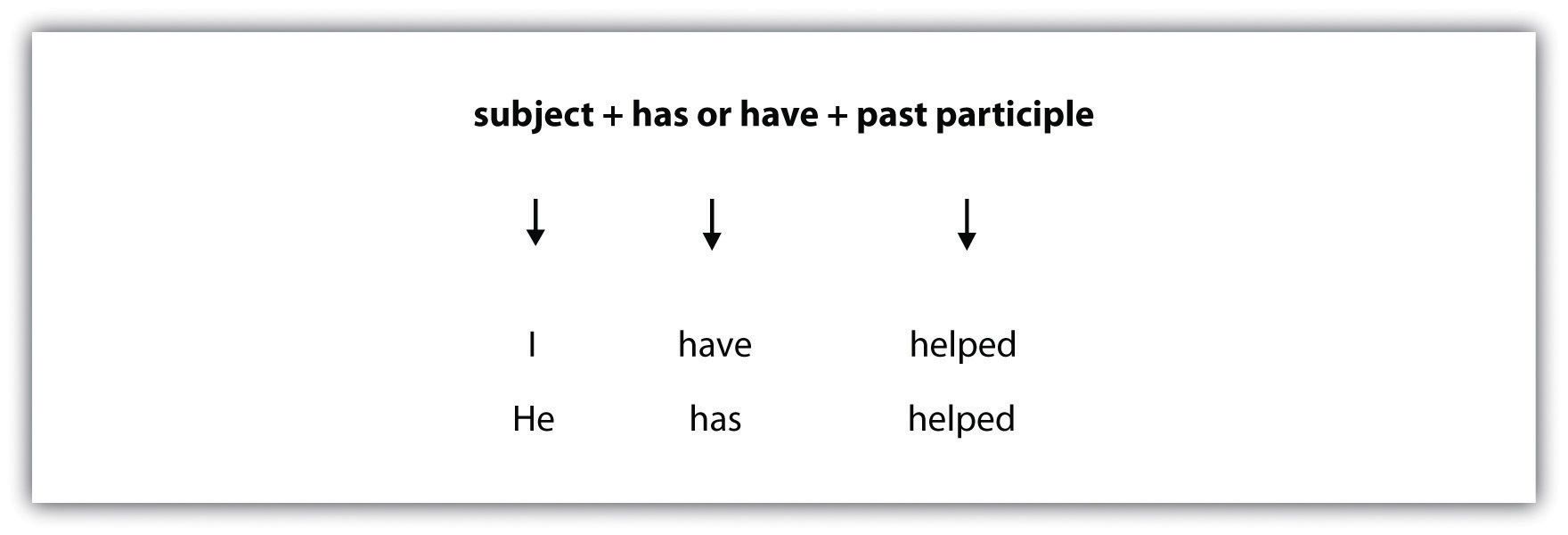
Remember, when a sentence contains a modal auxiliary before the verb, the helping verb is always have .
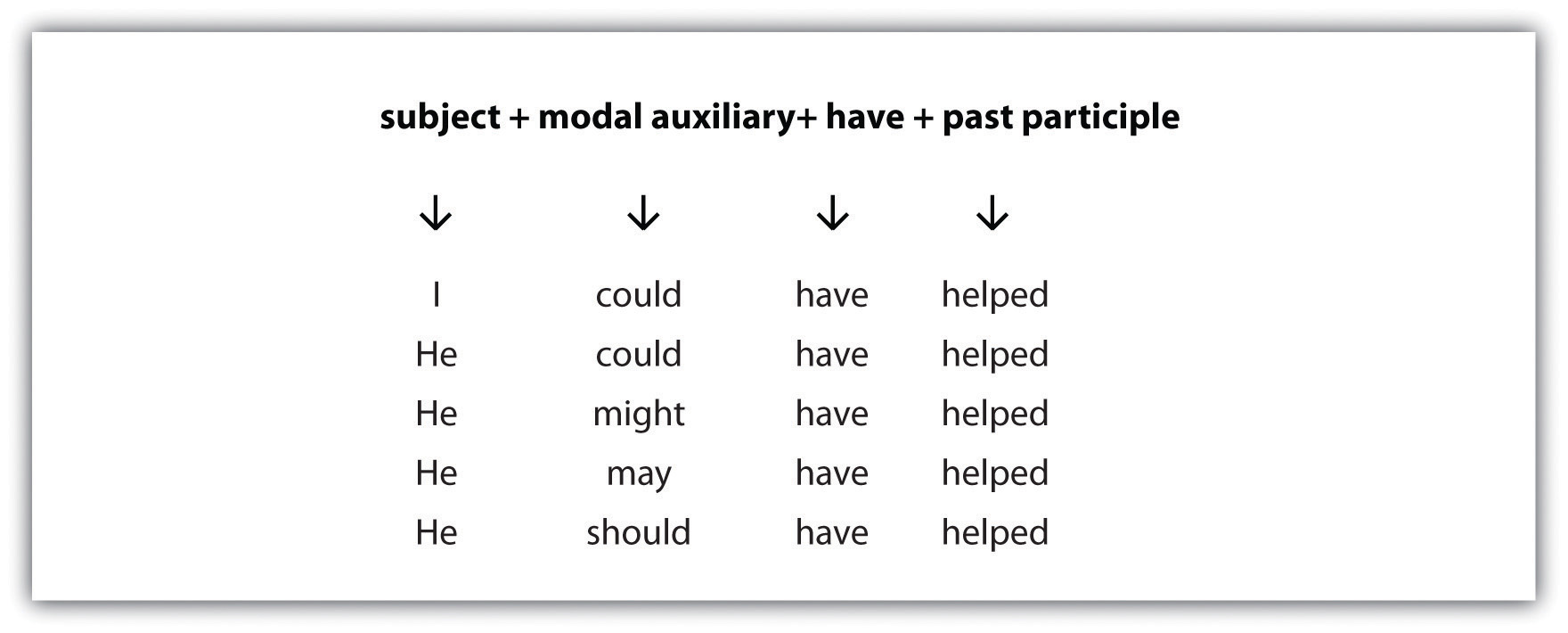
Be aware of the following common errors when using modal auxiliaries in the present perfect tense:
Using had instead of have
Incorrect: Jamie would had attended the party, but he was sick.
Correct: Jamie would have attended the party, but he was sick.
Leaving out have
Incorrect: Jamie would attended the party, but he was sick.
On a separate sheet of paper, complete the following sentences by changing the given verb form to a modal auxiliary in present perfect tense.
- The man ________ (laugh).
- The frogs ________ (croak).
- My writing teacher ________ (smile).
- The audience ________ (cheer) all night.
- My best friend ________ (giggled).
Key Takeaways
The basic formula for using a modal auxiliary is
- There are ten main modal auxiliaries in English: can , could , may , might , shall , should , will , would , must , and ought to .
- The four common types of errors when using modals include the following: using an infinitive instead of a base verb after a modal, using a gerund instead of an infinitive or a base verb after a modal, using two modals in a row, and leaving out a modal.
- In the present perfect tense, when a sentence has a modal auxiliary before the verb, the helping verb is always have .
- The two common errors when using modals in the present perfect tense include using had instead of have and leaving out have .
Writing Application
On a separate sheet of paper, write ten original sentences using modal auxiliaries.
Writing for Success Copyright © 2015 by University of Minnesota is licensed under a Creative Commons Attribution-NonCommercial-ShareAlike 4.0 International License , except where otherwise noted.
- Cambridge Dictionary +Plus
Modal verbs and modality
Modality is about a speaker’s or a writer’s attitude towards the world. A speaker or writer can express certainty, possibility, willingness, obligation, necessity and ability by using modal words and expressions.
Speakers often have different opinions about the same thing.
These speakers are looking at the same thing.
Modal verbs
Here are the main verbs we use to express modal meanings:
Core modal verbs: can , could , may , might , will , shall , would , should , must
Semi-modals: dare, need , ought to , used to
Other verbs with modal meanings: have (got) to, be going to and be able to
Be going to : form
Have got to and have to
Modal words and expressions
There are a number of other words and expressions in English, apart from the main modal verbs, which also express modal meanings.
Here are some examples:
Modality: meanings and uses
Modality: other modal words and expressions
Be expressions ( be able to , be due to )

Word of the Day
Your browser doesn't support HTML5 audio
a unit for measuring the loudness of sound

Varied and diverse (Talking about differences, Part 1)

Learn more with +Plus
- Recent and Recommended {{#preferredDictionaries}} {{name}} {{/preferredDictionaries}}
- Definitions Clear explanations of natural written and spoken English English Learner’s Dictionary Essential British English Essential American English
- Grammar and thesaurus Usage explanations of natural written and spoken English Grammar Thesaurus
- Pronunciation British and American pronunciations with audio English Pronunciation
- English–Chinese (Simplified) Chinese (Simplified)–English
- English–Chinese (Traditional) Chinese (Traditional)–English
- English–Dutch Dutch–English
- English–French French–English
- English–German German–English
- English–Indonesian Indonesian–English
- English–Italian Italian–English
- English–Japanese Japanese–English
- English–Norwegian Norwegian–English
- English–Polish Polish–English
- English–Portuguese Portuguese–English
- English–Spanish Spanish–English
- English–Swedish Swedish–English
- Dictionary +Plus Word Lists
To add ${headword} to a word list please sign up or log in.
Add ${headword} to one of your lists below, or create a new one.
{{message}}
Something went wrong.
There was a problem sending your report.
If you're seeing this message, it means we're having trouble loading external resources on our website.
If you're behind a web filter, please make sure that the domains *.kastatic.org and *.kasandbox.org are unblocked.
To log in and use all the features of Khan Academy, please enable JavaScript in your browser.
Course: Grammar > Unit 2
- Perfect progressive aspect
- Perfect progressive verb aspect
- Managing time with tense and aspect
Modal verbs
Want to join the conversation.
- Upvote Button navigates to signup page
- Downvote Button navigates to signup page
- Flag Button navigates to signup page

Video transcript

Expressing Ability and Possibility- Grammar Models
November 22, 2023
Modals constitute an important grammar concept in English. These special verbs precede other verbs to express shades of possibility, permission, requests, offers, ability, necessity and advice. Understanding modals helps communicate accurately and politely. This guide covers definition, usage, and examples specifically applying modals to express ability and possibility.
Defining Modal Verbs Unlike normal verbs, modal verbs don’t change form. They have no infinitive, past participle, or present participle “-ing” versions. Common ones include: Can – Could Will – Would May – Might Shall Should – Ought Must
We use modals followed directly by the simple form of a verb, like “can go”, “should drive”, “must go” instead of “can going”, “should drove” etc. Their interpretation changes meaning dramatically based on context.
Communicating Possibility with “Can”, “Could” and “May” We often use “can”, “could” and “may” to discuss possibility or ask permission.
Can/Could “Can” describes current general ability in the present tense: “I can lift 50 pounds with this forklift.”
Meanwhile, “could” suggests possibility in the past tense: “I could have chosen better words in our argument yesterday.”
May “May” seeks polite permission or indicates a higher degree of uncertainty: “May I use the restroom?” “That medication may cause dizziness.”
Conveying Ability With “Can” and “Could” Both “can” and “could” apply regarding ability. “Can” discusses current capability:
“I can speak and understand English fluently.”
“Could” references either past or hypothetical ability:
“As a child, I could recite 50 digits of Pi from memory.” “Under the right conditions, this polymer could withstand 500 pounds of pressure.”
Hedging With “Would”, “Might” and “May” To soften statements or suggest uncertainty, we can use:
Would – past tense of will Might – possibility May – slight probability
For example: “She would make an excellent mentor based on her experience.” “This home remedy might soothe a sore throat.” “Investing in that stock may prove risky.”
In summary, modals allow concise, precise ways to express permission, possibility, and ability. They have special rules but consistent patterns across tense usage. With practice, modal mastery helps English speakers appropriately discuss likelihood and skill with grace.
Related posts:
- Connecting Ideas in Sentences- Grammer Conjunctions
- Main Versus Subordinate Clauses
- English Vocabulary
- Present/Past Tense- Verbs
Leave a Comment Cancel reply
Save my name, email, and website in this browser for the next time I comment.
most recent

Language Learning
Ted talks- perfect for english beginners.
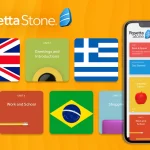
Is Rosetta Stone learning accessible globally?

Is Coursera suitable for learners of all ages?

Is Busuu suitable for self-paced learning?

Can Duolingo help with advanced language skills?
Educational tips , grammar and language , language comparison , language learning , vocabulary and language, complete guide to definite and indefinite articles.
Modal Verbs
Perfect english grammar.

1: They don't use an 's' for the third person singular. 2: They make questions by inversion ('she can go' becomes 'can she go?'). 3: They are followed directly by the infinitive of another verb (without 'to').
Probability:
- It's snowing, so it must be very cold outside.
- I don't know where John is. He could have missed the train.
- This bill can't be right. £200 for two cups of coffee!
- She can speak six languages.
- My grandfather could play golf very well.
- I can't drive.
Obligation and Advice
- Children must do their homework.
- We have to wear a uniform at work.
- You should stop smoking.
- Could I leave early today, please?
- You may not use the car tonight.
- Can we swim in the lake?
- When I lived in Italy, we would often eat in the restaurant next to my flat.
- John will always be late!
Past modals

Hello! I'm Seonaid! I'm here to help you understand grammar and speak correct, fluent English.

Read more about our learning method
Modal Verbs: Useful Rules, List and Examples in English
Are you struggling to understand the concept of modal verbs? Look no further! In this article, we will dive into the basics of modal verbs and provide you with a clear understanding of their function in English grammar.
It is important to note that modal verbs have a unique set of rules that differ from regular verbs. For example, they do not use an “s” for the third person singular, and they make questions by inversion. It is also important to understand the different nuances of each modal verb and how they are used in context. So, let’s get started and explore the world of modal verbs together!

Definition of Modal Verbs
Modal verbs are a special class of auxiliary verbs that are used to modify the meaning of the main verb in a sentence. They are also known as modal auxiliary verbs or simply modals. Modal verbs are used to express different kinds of meanings such as possibility, ability, permission, necessity, and more.
Modal verbs are always used in combination with ordinary verbs and they change the meaning of the verb to something different from simple fact. They are commonly used in English and are an essential part of the language.
The following are some of the most common modal verbs in English:
Each of these modal verbs has a specific meaning and usage in English. For example, “can” is used to express ability, “may” is used to express possibility, and “must” is used to express necessity.
Modal verbs are also used to create different tenses in English. For example, “could” is used to create the past conditional tense, while “will” is used to create the future tense.
It is important to note that modal verbs do not have infinitive or participle forms. They are always used in their base form, and they do not take the -ing or -ed endings.
In summary, modal verbs are a special class of auxiliary verbs that are used to modify the meaning of the main verb in a sentence. They are used to express different kinds of meanings such as possibility, ability, permission, necessity, and more. Understanding the usage of modal verbs is essential for effective communication in English.
Types of Modal Verbs
Modal verbs are auxiliary verbs that express a range of meanings such as ability, permission, possibility, obligation, and advice. Here are the different types of modal verbs:
Modal verbs of ability express whether you are capable of doing something or not. The most common modal verbs of ability are “can” and “could.” Here are some examples:
- You can speak English fluently.
- I could run a marathon when I was younger.
Modal verbs of permission express whether you are allowed to do something or not. The most common modal verbs of permission are “may” and “can.” Here are some examples:
- May I leave early today?
- Can I borrow your car for the weekend?
Possibility
Modal verbs of possibility express the likelihood of something happening. The most common modal verbs of possibility are “may,” “might,” “could,” and “can.” Here are some examples:
- It may rain later today.
- The train might be delayed.
- She could be at home.
Modal verbs of obligation express whether you are required to do something or not. The most common modal verbs of obligation are “must” and “should.” Here are some examples:
- You must submit your report by Friday.
- You should apologize for your mistake.
Modal verbs of advice express recommendations or suggestions. The most common modal verbs of advice are “should” and “ought to.” Here are some examples:
- You should exercise regularly to stay healthy.
- You ought to try the new restaurant in town.
In summary, modal verbs are essential in expressing different meanings in English. Understanding the different types of modal verbs can help you communicate more effectively and accurately.
Modal Verbs: Rules & Examples
Learn how and when to use modal verbs in English with rules and example sentences.
1. To indicate that something is probable or possible, or not so.
For example:
- It is sunny today; it must be warm outside. = It is sunny today; it is probably warm outside.
- His mobile is not reachable; he may/might/could be travelling by metro. = His mobile is not reachable; it is possible that he is travelling by metro.
- This can’t be our bill. = It is not possible that this is our bill.
2. ‘Can’ and ‘could’ are used to refer to skills and abilities.
- He can cover a hundred metres in under ten seconds.
- My father could see perfectly before the age of fifty.
- I can’t ride a horse.
3. ‘Must’ is used to indicate that something is necessary or of extreme importance, and ‘should’ is used to suggest that something is advisable.
- You must do your homework.
- You mustn’t skip school.
- You should say sorry.
- You shouldn’t smoke.
4. ‘Can’, ‘could’ and ‘may’ are used to ask for, give and withhold permission.
- Can I try my hand at it?
- Could we disperse early today?
- You may not enter the premises.
5. ‘Will’ and ‘would’ are used to refer to habits and inclinations.
- When I was a child, I would often climb trees.
- I will never refuse you anything.
- He would never do such a thing.
Note : These verbs differ from ordinary verbs in 3 respects.
- When used with the third person singular (he, she), they don’t require the addition of an ‘s’.
- They can be used to form questions by inverting the structure of the sentence.
- They can be followed directly by the verb, without the use of ‘to’.
Usage of Modal Verbs
Modal verbs are an essential part of English grammar. They are used to express a variety of meanings such as ability, possibility, permission, and obligation. In this section, we will discuss the usage of modal verbs in statements, questions, and negative sentences.
In Statements
Modal verbs are often used in statements to express various meanings. Here are some examples:
- Ability: “I can speak French fluently.”
- Possibility: “It may rain tomorrow.”
- Permission: “You may leave the room now.”
- Obligation: “You must finish your homework before going out.”
Note that when using modal verbs in statements, the main verb is always in its base form (infinitive) without “to.”
In Questions
Modal verbs are also commonly used in questions to ask for permission, ability, or possibility. Here are some examples:
- Permission: “May I leave the room now?”
- Ability: “Can you swim?”
- Possibility: “Could it be true?”
In questions, the modal verb is usually placed at the beginning of the sentence.

In Negative Sentences
Modal verbs can also be used in negative sentences to express the absence of ability, permission, or obligation. Here are some examples:
- Ability: “I cannot speak French fluently.”
- Permission: “You may not leave the room now.”
- Obligation: “You must not forget to lock the door.”
In negative sentences, the word “not” is added after the modal verb.
It is important to note that some modal verbs have different meanings depending on the context. For example, “must” can express obligation, but it can also be used to express a strong recommendation or deduction. In addition, some modal verbs have more than one form, such as “may” and “might,” which can both be used to express possibility.
Overall, modal verbs are an important part of English grammar and are used in a variety of contexts. By understanding their usage in statements, questions, and negative sentences, you can improve your English communication skills.
Common Modal Verb Phrases
Modal verbs are often used with other verbs to create phrases that convey a specific meaning. Here are some common modal verb phrases and their meanings:
- Can’t help but – This phrase is used to express that you cannot stop yourself from doing something. For example, “I can’t help but smile when I see puppies.”
- Have to – This phrase is used to express obligation or necessity. For example, “I have to finish my homework before I can go out.”
- Need to – This phrase is used to express that something is necessary. For example, “I need to drink water after exercising.”
- Should have – This phrase is used to express regret about something that was not done in the past. For example, “I should have studied more for the test.”
- Would rather – This phrase is used to express a preference. For example, “I would rather stay at home than go to the party.”
- Must have – This phrase is used to express certainty about something that happened in the past. For example, “He must have left his phone at home.”
- Might as well – This phrase is used to suggest doing something because there is no reason not to. For example, “Since we have some extra time, we might as well go for a walk.”
Modal verb phrases can be very useful in expressing specific meanings and adding nuance to your language. It’s important to use them correctly and in the appropriate context.
Modal Verbs vs Auxiliary Verbs
When it comes to understanding the English language, it’s important to know the difference between modal verbs and auxiliary verbs. While both of these types of verbs are used to help the main verb in a sentence, there are some key differences between them.
Modal Verbs
Modal verbs, also known as modal auxiliary verbs, are a group of verbs that give additional information about the function of the main verb. They show possibility, intent, ability, or necessity. Modal verbs do not change their appearance, and they are used alongside the infinitive form of the main verb of a sentence.
Some common examples of modal verbs include:
Modal verbs are used to show if you believe something is certain, possible, or impossible. They can also be used to talk about ability, ask permission, and make requests and offers.
Auxiliary Verbs
Auxiliary verbs , also known as helping verbs, are used to help the main verb in a sentence. They change according to certain factors in the sentence, such as tense, person, and number.
Some common examples of auxiliary verbs include:
Auxiliary verbs can be used to form different tenses, such as the present perfect or past continuous. They can also be used to form questions and negatives.
In summary, the main difference between modal verbs and auxiliary verbs is that modal verbs do not change their appearance, while auxiliary verbs change according to certain factors in the sentence. Understanding the difference between these two types of verbs can help you to use them correctly in your writing and speaking.
Modal Verbs in Different Tenses
When it comes to tenses, modal verbs are quite unique. Unlike regular verbs, modal verbs do not change their form to indicate different tenses. They are used in their base form regardless of the time frame.
Modal verbs can refer to present and future time, but only some of them can refer to past time. Here is a table showing the modal verbs that can be used to refer to past time:
For example, “I could swim when I was younger” or “He would always help me with my homework.”
It’s important to note that when using modal verbs to refer to past time, the main verb in the sentence should be in the base form as well. For example, “I could have gone to the party, but I decided not to.”
In addition to the past time usage, here are some examples of how modal verbs can be used in different tenses:
- Present: “You should eat more vegetables.”
- Future: “We will have to leave early tomorrow.”
- Perfect: “He must have forgotten his phone at home.”
- Continuous: “They might be playing tennis right now.”
Overall, modal verbs are a versatile and useful tool in English grammar. By understanding how they can be used in different tenses, you can effectively communicate your intentions and convey meaning in your writing and speech.
Frequently Asked Questions
What are some examples of modal verbs in English?
Modal verbs are used to express ability, possibility, necessity, and permission. Some examples of modal verbs in English include can, may, must, shall, will, could, might, should, and would.
How many modal verbs are there in English?
There are nine modal verbs in English: can, may, must, shall, will, could, might, should, and would.
What is the definition of modal verbs and how are they used?
Modal verbs are auxiliary verbs that are used to express various meanings such as ability, possibility, necessity, and permission. They are followed by the base form of a verb and do not change their form based on the subject of the sentence. Modal verbs can also be used to make requests, give advice, and express opinions.
What is a good worksheet for practicing modal verbs?
There are many worksheets available online for practicing modal verbs. One good worksheet is the “Modal Verbs Practice” worksheet from Englishlinx.com. This worksheet includes exercises for practicing the different uses of modal verbs in English.
What are some common sentences using modal verbs?
Some common sentences using modal verbs include:
- I can swim.
- You should study for the test.
- He may arrive late.
- We must finish the project by Friday.
- They could come to the party.
How do you pronounce modal verbs correctly?
Modal verbs are pronounced with stress on the first syllable. For example, can is pronounced as “kan,” may is pronounced as “may,” and must is pronounced as “must.”
Related Posts:

thank you so much
Its amazing
Thank you. This would help me with my students.
- Implementation
- Posters & Presentations
Multimodal Essays
- Interactive Works
- Rubric Language
- Sample Rubrics
- Student Resources
- Nifty Tools
Multimodal essays of all different forms can deliver an emotive argument by using images, time, sound, rhythm, etc… to activate a conceptual and intuitive connection with an audience. This type of project involves an awareness of how storytelling can illicit affective responses, and students will have to work through their materials in a way that delivers information to activate these dimensions. Usually a multimodal essay is a very creative endeavor as students work through material to make a smooth or purposefully broken narrative delivery, and it is a highly active way for students to arrange, compile and perform curriculum.
A multimodal essay can exist in many forms, from still image compositions to audio casts to video narratives or even animations. Below are a few ideas that can be achieved through digital media, but the project should also incorporate a storyboard component to help students develop the work and alleviate too much post-editing. Please be cautious of expectations for this project as it can be quite time consuming, so you may want to keep it quite specific, and on the short side!
Photographic and especially video editing programs need computing power because they are editing large data images. Below are some low cost or free options you can recommend to your students, as well as professional programs available for student to use on UBC computers.
Projects Ideas
A photo essay is a visual display of a topic or of information through images captured by camera. These depictions are accompanied by text to provide the audience with a context, or a point of view, that might not be clear in the picture(s). The purpose of a photo essay is to offer the development of a particular topic with a clear objective in mind – to denounce, inform, criticize, explain etc.
- Have students pursue research on a particular subject, space or person by taking a series of original photo documents . Have them photograph change in people or geographical locales, significant moments or everyday events, objects or materials, behind the scenes or different perspectives of the same subject, etc… After exploring the topic visually, students can then connect it to ideas, insights and revelations that activate class concepts, and visually order and align the photographs with written descriptive text, guiding the viewer through the results of their exploration.
- Have students create, refine and depict a particular archive formula to provide them with boundaries and strategies to create an archive either sourced or made from images or videos within the parameters decided upon to guide them. For example, a student might organize the first 100 image results of a google search resulting from the words “romantic couple”, from here they will find archive categories for their results that they will then display. For example, categories they could define and create can be; age of the subjects, sexuality, ethnicity, depicted intimacy gestures, etc.. They would then display this archive in a moving chronology or still image layout.
- Stephan Rousseau: Riding the Tube Photo Essay
- Steven Shearer: Photocollage "Slumber"
- Ed Ruscha: Twentysix Gasoline Stations
Useful Links
- Photo narratives: Defining picture stories, essays and packages
A video essay is a multimodal piece that attempts to present, support or develop a thesis or proposition about a specific topic and can use narrative and story development in the making of a work. It usually combines audio and visual modes, may include text, and is rendered through a written plan. The piece narrates a story, explanation or analysis using multimedia formats to immerse the viewer into a particular reading and effect.
- Create a work that uses a voice-over dialogue over film and/or still images. For example, students can study a specific area in the city by filming it, collecting archival images, and writing and sound recording a written analysis of the area. Another idea is to have students complete a structural analysis of a particular film, to uncover hidden meaning or sub textual emphasis by analyzing a collection of scenes from a film or television show and observe how a film’s story takes shape. Students would edit the footage and render the information tied together through their voice-over analysis.
- Documentarian Ken Burns used this technique extensively; the Ken Burns effect is a moving video where the lens travels across still images (photographs, graphics, charts, maps, etc…) with moving, zooming and panning effects, focusing in on specific areas of the image. The technique works best when accompanied by an audio narrative which can be used to describe areas in focus, and other translations of what is visually projected. For example, you might animate a still graphic with a moving lens and focus area, and have the audio narrative describe what the graph relays, and conclusions as to what this might mean. An Art Historian might use it to navigate a painting with audio narration of a formal analysis, or a creative writing class may want to pair sound and still image to examine illustrations for a storybook.
- A more experimental form of film can explore other practices of meaning making that differ from the traditional avenues. It attempts to diverge from mainstream productions by disrupting conventional narrative forms; particularly, it breaks and plays with the idea of time-space continuum, and can collage effects into a visually stimulating moment wherein the process of making creatively informs the content it is critiquing. An experimental video work may also recut sources through conceptual analysis, bringing out another reading.
- Viewing Between the Lines: Hong Sang-soo’s The Day He Arrives film analysis
- "The Making of Migrant Mother" on Dorothea Lange
- "How Black Lives Matter in The Wire" by Jason Mittel
- Edgar Wright “How to do Visual Comedy”
- Chris Marker "La Jetee" Ken Burns Effect
- Looking at paintings video from the Khan Academy
- Julien & Simon Dara "The Ordinary"
- Miguel Maldonado, Reel
- What is a video essay?
- The Video Essay as Art: 11 Ways to Make a Video Essay
- Experimental filmmaking for dummies P1
- MOMA: Experimentation in film
- Avant-garde film theory
- “Teaching While Learning: What I Learned When I Asked My Students to Make Video Essays”
- “The Video Essay: The Future of Academic Film and Television Criticism?”
Explainer Video
Usually shorter in duration, a video explainer describes an idea in a simple and appealing fashion. It attempts to answer basic what, when, where, how or why questions. There are different formats in which they can be developed: live action, animated or whiteboard simulation.
- Have students create a 2 to 3-minute video (it can also be longer, but it is meant to be short in nature) to explain an idea succinctly and poignantly, but also in an entertaining fashion. The piece should attempt to answer basic what, when, where, how or why questions.
- Test student comprehension of literature, a theory, historical event, etc.. by asking them to make a video trailer for the moment. Have a very brief time limit so that they deliver the progression of the idea as succinctly and poignantly as possible, while also building up a reason/purpose to why it is important and intriguing to know, just as a trailer does.
- Could underwater farms help fight climate change? Ayana Elizabeth Johnson and Megan Davis
- TedEd: How does the stock market work?
- Why is the Solar System Flat?
- Art historical analysis of Goya’s Third of May
- Wonder Book trailer
- Marcel the Shell with Shoes On trailer
- Vyond: What is an explainer Video with examples
- 5 Best explainer videos & how to make your own
- Lakehead University Explaining Explainer Videos
A podcast can be a single or set of audio episodes or chapters that concentrate in a specific topic. The development of the topics can be provided by one person or a group of people, and at times, guests might appear in an episode in interview form. Audio techniques such as sound effects and mood music can help deliver ideas.
- Producing an episode podcast can allow students a way to collaborate and express an idea on a certain subject, and to craft and verbally unfold an argument from written language on paper to dynamic sound and narrative. Students can include other voices via sound bites and interviews, and narrate the piece via a sound track and sound effects. Episodes on a particular subject of your class can gather together into a class series you can host online.
- Ask students to step into someone else’s shoes, consider another position or frame of reference, and perform in that mode via a developed podcast. For example, you might ask students to take an example from class and become the person in the example, this can include historical figures or a medical subject, etc… From here, students can enact and express their point of view and perspective on an issue, giving enough information to develop the character, time period, social and/or political situation. This can include background sounds and effects, soundtracks, and narrative of different voices, interviews
- FutureThinkers: Podcast about evolving technologies, society and consciousness
- The Conversation: In Depth out Loud
- Science History: Distillations
- Allusionist: A Podcast about Language by Helen Zaltzman
- The Skeptics Guide to the Universe
- BBC Podcasts
- Carnegie Melon: Podcasting Handout
- A beginner's guide to academic podcasting
- 7 things you should know about podcasting handout
- Vanderbilt University Podcasting Resources
Experiential Learning Process Video
A video presentation in experiential learning classes can make space for student reflections about their processes particular to their experiences and partnerships. It seeks to analyze and convey the experience students have when provided with practical experience of a hands-on opportunity to solve a problem in the real world. While making the work, students can reflect and work through their experience by visually demonstrating:
- Challenges they faced and how they overcame them
- How the solutions they provided might differ or be similar to the ones presented in the class literature
- The changes in preconceived notions they had prior to the project (e.g., biases with the community they were working or the topic, how to solve of a problem of the sort)
- The new skills they developed while doing the project
- How the skills or knowledge gained might be helpful in their future, be it professional or personal
"I think writing a report would have limited our creative vision in the storytelling aspect of our final report, and easily less effective because readers would only be left to imagine what kind of things were accomplished throughout the process."
Student Reflection
To target more overlooked or invisible facets of experiential learning, the aim of the video is to reflect, not to report. Hence, it would be ideal for both students and teachers to focus on the reflection of the experiences they underwent more than reporting the process in itself. Resources to help with creating an experiential learning multimodal project is available in our Implementation section on Scaffolded Curriculum as well as in the following example of student work from the class.
- Example from Dr. Richard Arias Hernandez, Winter 2019 INFO 250 class
- Another example from Dr. Richard Arias Hernandez, Winter 2019 INFO 250 class
- Centre for Community Engaged Learning, Faculty Curriculum Resources
Some recommended programs:
- Camtasia *
- VideoScribe *
- Apple iMovie
- Audacity for audio
* UBC obtained a license for faculty, staff and student use free of charge. Download here.
- Renderforest
Available on UBC Computers
UBC has many professional programs available on library computers and digital labs from Adobe Creative Cloud for Photoshop and InDesign (photo editing and layout) and Premiere (video editing) as well as Final Cut Pro .
Warning: These programs can be expensive for a student to purchase on their own.
- No category
English Quarter 2 Module 4 Argumentative Texts Modal Verbs and Modal Adverbs (1)
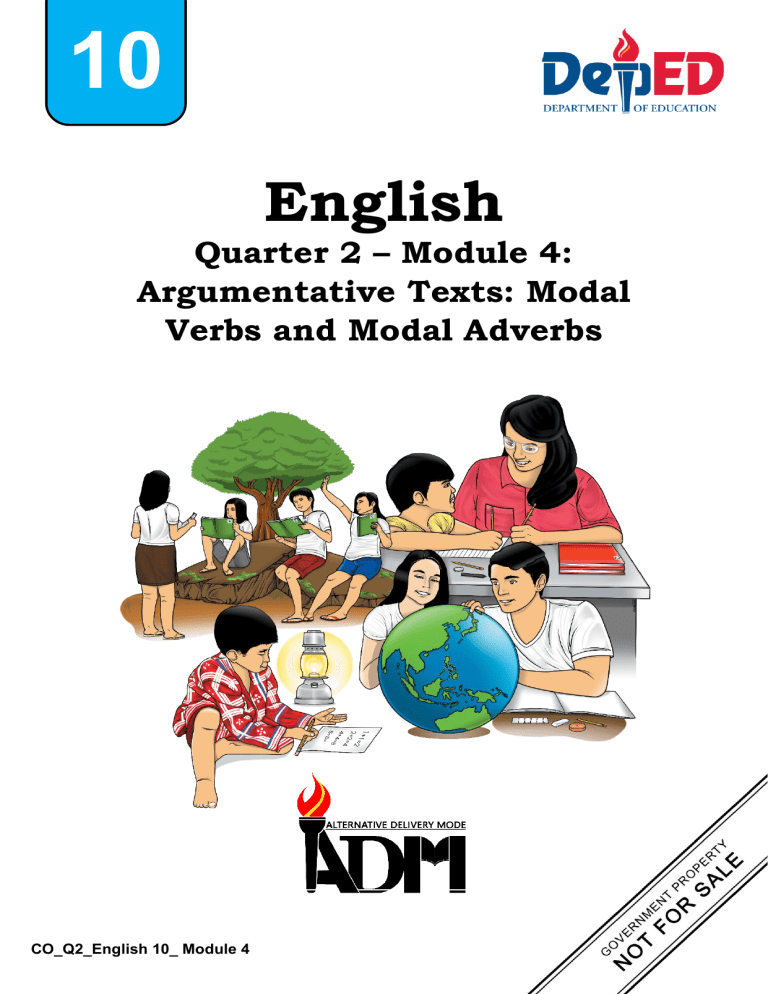
Related documents

Study collections
- My collection
Add this document to collection(s)
You can add this document to your study collection(s)
Add this document to saved
You can add this document to your saved list
Suggest us how to improve StudyLib
(For complaints, use another form )
Input it if you want to receive answer
EnglishGrammarSoft
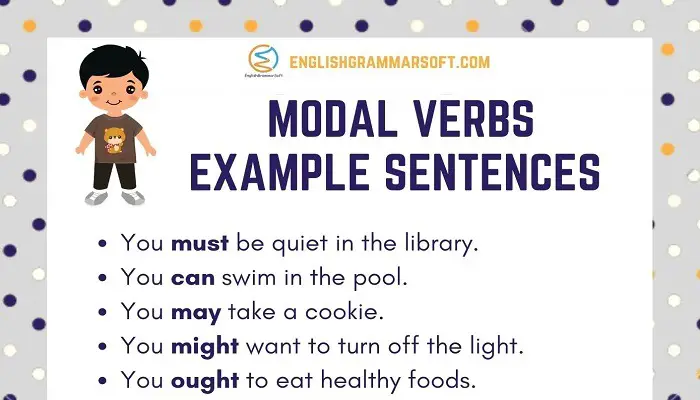
100 Example Sentences with Modal Verbs
Modal verbs are a type of auxiliary verbs that are used to express ability, possibility, necessity, or permission. Modal verbs include can, could, may, might, must, ought, shall, should, will, and would. These verbs are typically used before the main verb in a sentence to indicate the level of ability, possibility, necessity, or permission involved. For example:
- I can swim. (This means that I am able to swim.)
- He could run faster when he was younger. ( This means that he had the ability to run faster when he was younger. )
- We may go to the park later. (This means that it is possible that we will go to the park)
Sentences with Modal Verbs
- You must be quiet in the library.
- You can swim in the pool.
- You may take a cookie.
- You might want to turn off the light.
- It would be best if you studied for your test.
- You ought to eat healthy foods.
- Can you please be quiet?
- May I go to the bathroom?
- I can speak three languages.
- They might be at the park.
- We could go to the movies tonight.
- You may leave if you finish your work.
- She must have left by now.
- I would help you, but I’m swamped right now.
- You must be kidding me.
- She might be the one for me.
- He could be late for his appointment.
- They should have known better.
- I ought to go now.
- You must be tired after your long journey.
- She may be late – she didn’t leave home until after lunch.
- Can I borrow your pen, please?
- Might I ask you a few questions about the job?
- Shall we go out for a meal this evening?
- It would help if you stopped smoking.
- He must be home by now.
- I might be able to help you with that.
- They ought to be more careful.
- Could you please turn the music down?
- Would you mind closing the door?
- I don’t think you should do that.
- You can come with us if you want.
- We should probably get going soon.
- You ought to study more if you want to pass the test.
- He could have helped me, but he didn’t.
- They might not be able to come to the party tonight.
- We must be getting close to the campground now, right?
- You must be tired.
- She might be late.
- Could you open the window?
- We should go now.
- You ought to apologize.
- You could go to the store for me.
- We may go to the park later.
- Can you please turn off the light?
- Could you hand me that book?
- May I borrow your pen?
- Might I have a piece of cake?
- Must I finish my homework now?
- Ought we to call him first?
- Should you be studying right now?
- Will you please turn in your project tomorrow?
- Would you like to come over for dinner tonight?
- He could run faster when he was younger.
- You must be careful when you cross the street.
- They should arrive soon.
- Will you please turn off the light?
- Can you open this jar for me?
- Might I borrow your pen?
- Would you like some help with that?
- I ought to be getting home now.
- You should eat more vegetables.
- She must be at home by now.
- They might be hungry.
- Should we cancel our plans?
- Would you like some dessert?
- You must be kidding me!
- Could you please hand me the salt?
- We will be there in five minutes.
- I might go to the movies tonight.
- You ought to apologize to her.
- Can I borrow your pen?
- May I sit here?
- I shall go to the store.
- We shall overcome this difficult time.
- I could swim when I was younger.
- I would swim in it was warmer outside.
- She could hardly breathe.
- He could see the light at the end of the tunnel.
- I will be there for you.
- I will never leave you.
- I would never give up on my dreams.
- Even if everyone else does, I would still believe in myself.
- I would always be there for my loved ones.
- I may go to the store later.
- She could be home by now.
- They might not be able to come to the party.
- You must take more than one cookie.
- I might go to the store later.
- May I please borrow your pen?
- Could you turn down the music?
- You ought to brush your teeth twice a day.
- You ought to exercise for at least 30 minutes a day.
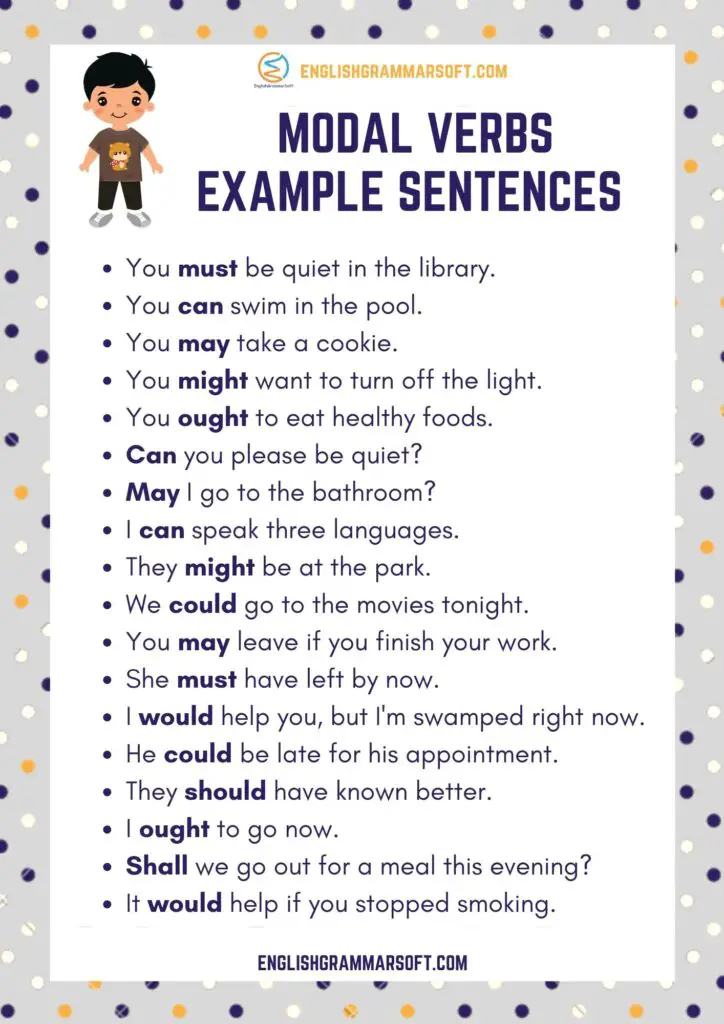
Similar Posts

Essay on Save Water (1000+ words) Simple Ways To Conserve
Saving water is vital to our planet. We must all do our part in conserving water because it is a finite resource. Water should be…

Sentences with Would (51 Examples)
51 example sentences using the word “would”. Sentences with Would I would love to go on vacation next week. I would like to go shopping today, but I can’t…
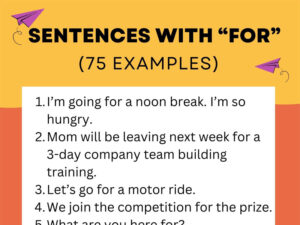
Sentences with “for” (75 Examples)
In this lesson, we are going to learn the word “for” and make “sentences with for”. This three letter word (FOR) could either be used…
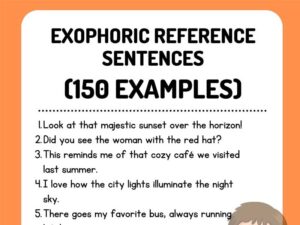
Exophoric Reference Sentences (150 Examples)
In the vast landscape of language, where words serve as the building blocks of communication, lies a remarkable phenomenon known as exophoric reference sentences. These…
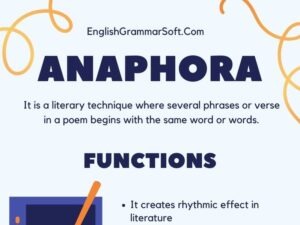
Anaphora Examples, Functions & Use in Poetry
What is Anaphora? Anaphora is a rhetorical device that uses repetition of the same word or phrase at the beginning of successive clauses. It can…
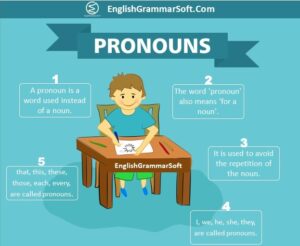
Pronoun | What does pronoun mean? Different Types of Pronouns with 60+ Perfect Examples
How to be more confident in your pronoun usage. It’s easy to get a little shy in the presence of people who know you so…
Leave a Reply Cancel reply
Your email address will not be published. Required fields are marked *
Save my name, email, and website in this browser for the next time I comment.

Essay – examples & model answers | B2 First (FCE)
FCE Essay Examples: Topic (Environment)
Example exam task:, example answer (grade: 3), example answer:.
I think that my country has problems with pollution to the environment like all other countries. This problem is normal for Russia. We have big problems with transport because there are too much cars in our country. And because of that we have problems with atmospeer, air in my city and in all Russia is really dirty and sometimes I can’t make a sigh because it smells around me and of course around that cars on the road. I’ve heard about tradition of one country. They don’t go anywhere by car one day a month or a year, they just use bycicle or their feet. I think it could be very good if we had a tradition like that.
So, what about the rivers and the seas? Yeah, there are some really good and clean rivers and seas where you can go, but there are not many of them. Once I saw the river OB in my city, it was about two years ago but I stil remember that in some places it was not blue, it was green or purple I didn’t really understand because it had different colours.
I don’t know what should we do. Maybe we should just open our eyes and look what we did. But Russian people don’t care about the world around them many people care only about themselves an that’s all.
So, the best idea is look around and try to do something good for our planet and for us and our children.
FCE, CAE, CPE
Practice, write & improve, examiners comments & grade:, example answer (grade: 3-4).
To begin with pollution and damage to the environment is the most serious and difficult problem for countries of all over the world. Scientists of different countries predict a global ecocatastrophe if people won’t change their attitude to our planet.
First of all a huge damage to the environment brings a transport. People can’t imagine their living without cars, buses, trains, ships and planes. But it’s an open secret that one of disadvantage of these accustomed things is harmful exhaust. Needless to say that use of environment friendly engines helps us to save atmosphere from pollution.
In addition to this our rivers and seas are in not less danger situation. It’s a fact of common knowledge that numerous factories and plants pour off their waste to ponds. Obviously that cleaning manufacturing water helps to avoid extinction of ocean residents.
Apart from this I’m inclined to believe that every person can and must contribute to solving this important problem. Doing a little steps for protection our environment every day we will be able to save our Earth. And it’s a task of each of us.
Model Answer (Grade: 5)
DEVELOPMENT VS ENVIRONMENT
If we surf the web looking for pollution and environmental catastrophes, we will find out that every country in the world suffers them. This is a natural consequence of the struggle between development and environment.
If a country decided to live isolated from the rest of the world, living on what it can naturally grow and produce, it surely wouldn’t be highly polluted. But we all want exotic food and technological items from all over the world, so we have to pay the price.
Investing on electrical transport would benefit the environment a lot. Even more if this electricity came from a natural source of energy like wind, rivers and solar boards. It’s difficult to achieve this because petrol companies will fight against these actions.
We also have to take care of our rivers and seas. We all have heard about factories throwing highly toxic substances to rivers, without minimizing their poisoning effects. A really strict law should be applied to fine these factories and make them change their policy.
But what about ourselves? We also can do a lot! If, when possible, we bought larger packs of food, we would be producing less rubbish. And this is only an example!
FCE Essay Examples: Topic (Fashion)
In today’s world, the fashion industry has a strong importance in people’s lives. The fashion industry say to the society what to wear and creates new types of clothes all the time.
Some people claim that the fashion industry has a bad effect on people’s lives, they say that the fashion industry creates clothes that the society has to wear. Furthermore, the clothes’ price is extremely high and people, who can’t afford it, should not be in the society.
In the other hand, the fashion industry guide the people to be in a good appearance, because, nowadays, the appearance of the person is more important than the person itself.
In my opinion, the fashion industry doesn’t has a bad influence on people’s lives. It’s something which was created to help people what to wear.
Example Answer (Grade: 4)
Fashion industry is very a discussed subject nowadays: they create and design new clothes everyday in order to satisfy some people needs.
There are many people who claim that the fashion industry is important and good for society. According to them, this industry design beautiful clothes and thanks to that every person can wear shirts, trousers or any acessory which is on today’s fashion.
On the other hand, the fashion industry in some people opinion, controls the market of clothes and because of that they can’t wear what they want to. In addition, the industry can increase the price of clothes, forcing people who don’t want to be “oldfashioned” to buy and pay a large amount of money to keep “beautiful”.
In my opinion, we can’t let the fashion industry decide what we must or musn’t wear. We shouldn’t judge people for its appearance,because that is not important. We must wear whatever we like, want and feel confortable with.
The society we live today is characterised by technology in constant development, fast speed processes, information travelling and getting to people at a blink of an eye and a complex web of social networking. In this context, the fashion industry is becoming increasingly important and having a more and more paramount role in our lives.
On one hand, the fashion industry is undeniably a source of profit and income. It hires millions of people all over the world and generates millions of dollars every year. Furthermore, such profitable business is also believed to be able to spread and make known the culture of a people, encouraging and enhancing a better understanding of each other.
Nevertheless, for those who are neither impressed nor motivated by numbers and figures, the fashion industry is seen as one which segregates people, isolating those who not fit their laws and commands. It is stated that people place too much importance on appearance and the material, world, sadly true, and the fashion industry just spurs on such situation. Moreover, not only are the costs of fashion item unrealistically high, it is thought to be a money better spent on more pressing issues, such as poverty and hunger.
I do believe that the fashion industry, as it is today, has a harmful effect, because it values a minority of people in detriment to the majority. However, it has such a wide reach that, it put into a good use, it can save lives.
FCE Essay Examples: Topic (Languages)
“There are more reasons to learn a foreign language than to pass a test”
Everything around us revolves around language(s), it is the most important thing in our lives. Society would just not function without it. They are It is our future and I would personaly love to learn as many as I possibly can.
Not everything in life is done because it is necessary. Learning a new language can be a lot of fun. Many people only do it as a hoby, or their knowledge is something that brings them pride and pleasure.
Secondly, we have people who do it simply to challenge themselves. Truly I believe that having a great outcome that stems from your hard work and dedication to learn something new is a wonderful way to challenge prove your ability to yourself and others. Then there is travelling. It is very important to be able to understand and have a conversation with someone abroad, unless you would like to get lost or worse.
To conclude, I think that learning a new language is an amazing thing no matter why you do it. It is always better to do things out of enjoyment, but even if you do it for a test, that knowledge will always be useful.
Learning a a foreign languages is very important nowadays. English, in particular, is essential because it allows is spoken all over the world. That’s the reason why we start studying it from the age of six years old. Going abroad and being able to speak to native people is very satisfying and that’s why I want to improve my knowledge about foreign languages.
I decided to take this exam to know how high my level of English is, but also because I need this certification to go abroad next summer. I really want to come back to Cornwall, an amazing region in the South-West of England. I’ve been there twice with my family, but now I want to go alone. Only being there to England I can really improve my English comprehension and speaking skills.
Fortunately I can will have some English lessons which taught in English at university and I can’t wait for it because it will be an interesting challenge for me. Studying foreign languages is essential to live and to travel. It isn’t simple and I surely have to challenge myself everyday, but the result is so satisfying that we I can’t do without it.
FCE Essay Example: Topic (History)
A very common topic that is being discussed nowadays is wether schools should teach subjects that some may consider useless later in life. A clear example is history, since it is quite difficult to learn and does not help us in day-to-day activities.
However, many people do not realize the importance of it or that it affects our lives today. For example, our political system would not be this way if it weren’t for the Ancient Greeks, numerous politicians and wars who helped shape democracy and our constitution. Yet it is still thought that it’s useless.
In addition, it is very important that we never forget about our past since we must know where we were standing years ago. Moreover, there are some things, such as World War II, that we have to remember to prevent them from happening again. We should also know where we we were standing a century ago: our origins, our identity. The more you learn about your ethnicity, the better.
All in all, I think that it is extremely important to learn about one’s own country’s history. Anyone who gets the chance to do this should not waste it, since they are very fortunate to have this opportunity
Would you pass B2 First (FCE)?

IMAGES
VIDEO
COMMENTS
Modals Examples; Logical possibility: This use of modals hedges, or weakens, the certainty of a sentence. The stronger the modal, the stronger the possibility. Must is so strong that it is almost forcing something to happen. On the opposite end, can, could, and might are all equally weak and show a lack of commitment or confidence.
Unit 15 Modals. Learning Objectives. To understand what modals are and what principles they follow. To learn the challenges and strategies in using appropriate modals. To learn the meanings and uses of modals and modal-like expressions through multiple examples. To practice using modals through a variety of writing situations.
Revised on December 6, 2023. A modal verb (also called a modal auxiliary verb) is used along with a main verb to express possibility, ability, permission, or necessity. For example, in the statement "you must leave," "must" is a modal verb indicating that it's necessary for the subject ("you") to perform the action of the verb ...
Grammatical Form. Modals are a special type of verbs; they are followed by the base form of verbs (e.g. I should go, she must see, he can swim ). In addition to the simple form of modals, there are also other forms to express: past time 1: modal + have + Past Participle (e.g., may have submitted) passive voice 2: modal + be + Past Participle (e ...
A multi-modal text employs more than one "mode" to communicate meaning beyond the written word alone. According to the New London Group, these are the five modes: LINGUISTIC/ALPHABETIC ― written and spoken words. VISUAL ― images (moving or still) AURAL ― sound, music. GESTURAL ― movement, expression, body language.
modal auxiliary. +. main verb. There are ten main modal auxiliaries in English: can, could, may, might, shall, should, will, would, must, and ought to. The four common types of errors when using modals include the following: using an infinitive instead of a base verb after a modal, using a gerund instead of an infinitive or a base verb after a ...
Functions of Modal Verbs This second table organizes examples of each modal by its use, also including an explanation. Use Explanation of use Modals Examples Logical possibility This use of modals hedges, or weakens, the certainty of a sentence. The stronger the modal, the stronger the possibility. Must is so strong that it is almost forcing
Modal verbs and modality - English Grammar Today - a reference to written and spoken English grammar and usage - Cambridge Dictionary
Modality is when we use these verbs to express conditions on stuff. So we can use these verbs to determine if something is likely to happen, or certain to have happened. Whether or not something is possible, or whether or not we have the ability to do something. Whether or not we have the permission to do something.
For example: "She would make an excellent mentor based on her experience." "This home remedy might soothe a sore throat." "Investing in that stock may prove risky." In summary, modals allow concise, precise ways to express permission, possibility, and ability. They have special rules but consistent patterns across tense usage.
Here's an example of how a modal verb gives shades of meaning to a sentence. Trina and Joan play the piano. Trina and Joan might play the piano. Another verb always follows modal verbs in base form. Remember not to conjugate the verb. For example: Incorrect: She can plays the piano. Correct: She can play the piano.
Modals are different from normal verbs: 1: They don't use an 's' for the third person singular. 2: They make questions by inversion ('she can go' becomes 'can she go?'). 3: They are followed directly by the infinitive of another verb (without 'to'). Probability: First, they can be used when we want to say how sure we are that something happened / is happening / will happen.
Might. Must. Shall. Should. Will. Would. Each of these modal verbs has a specific meaning and usage in English. For example, "can" is used to express ability, "may" is used to express possibility, and "must" is used to express necessity. Modal verbs are also used to create different tenses in English.
Multimodal Essays. Multimodal essays of all different forms can deliver an emotive argument by using images, time, sound, rhythm, etc… to activate a conceptual and intuitive connection with an audience. This type of project involves an awareness of how storytelling can illicit affective responses, and students will have to work through their ...
Modals can be defined as a subset of the English auxiliary verbs and are used to show modality like obligation, and possibility, etc. They don't have an infinitive form or participle which can be used to differentiate them from other verbs along with their neutralization. Some other verbs are also sometimes, but not always, categorized as ...
In order to get a high band score for your writing you need to be able to naturally use a wide range of grammar structures. For Task 2 writing, this means correctly using complex structures, but it also means using more basic structures naturally, including modal verbs. Sample Essay Below is a sample essay for the following question.
CO_Q2_English 10_ Module 4. What is It. Modal Adverbs are used to modify specific verbs that consist of a linking verb (verb of. being) and sometimes another verb. Here are examples of modal adverbs: probably, possibly, evidently, certainly, surely, undoubtedly, seriously, clearly, obviously. 1.
100 Example Sentences with Modal Verbs - EnglishGrammarSoft. Modal verbs are a type of auxiliary verbs that are used to express ability, possibility, necessity, or permission. Modal verbs include can, could, may, might, must, ought, shall, should, will, and would. These verbs are typically used before the main verb in a sentence to indicate the ...
FCE Essays - Sample/model answers and examiner comments. An essay is always written for the teacher. It should answer the question given by addressing both content points and providinga new content point of the writer's own. ... There are attempts to express ideas using a range of grammatical forms, passives and modals for example, but these ...
3. Negative modals are formed in this order: MODAL + not + VERB. 4. Questions with modals are formed in this order: MODAL + SUBECT + VERB. 5. Modals can be used with the progressive forms (verbs ending in -ing). 6. Some modals have contracted forms, but contractions should be avoided in formal writing. * In groups, complete PRACTICE 3, p. 153.
A modal verb is a verb, for example 'can', 'might', or 'must' that is used before another verb to show that something is possible, necessary, etc. Here are some of the uses and meanings of modal verbs. For a more detailed description, use a good grammar book. Here are the main modal verbs of English: can could may might must ought ...
Higher education isn't daycare. Here are the rules we follow on free speech and public protests.